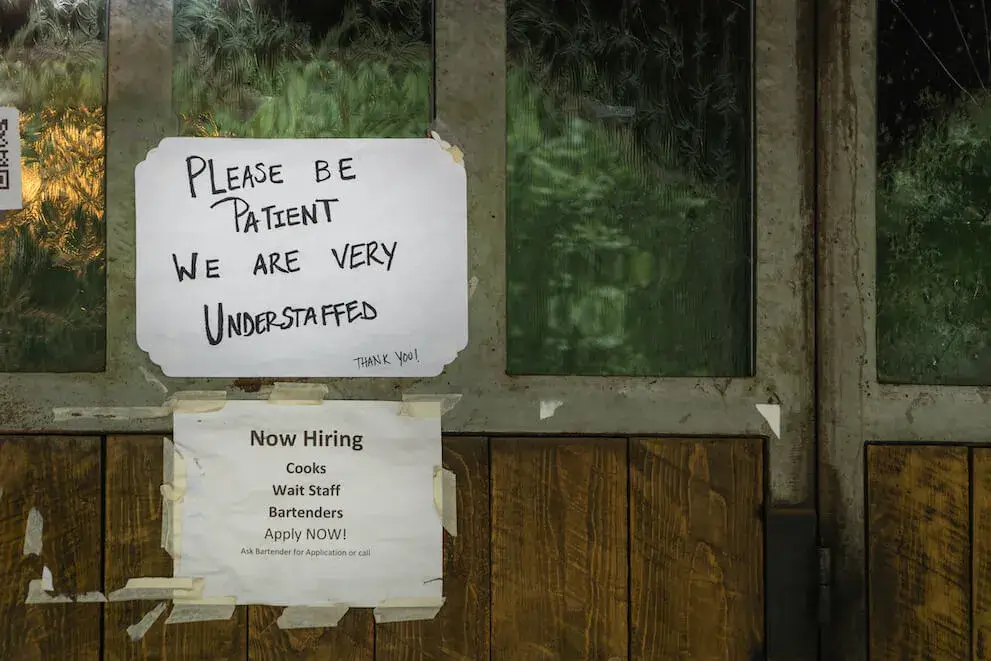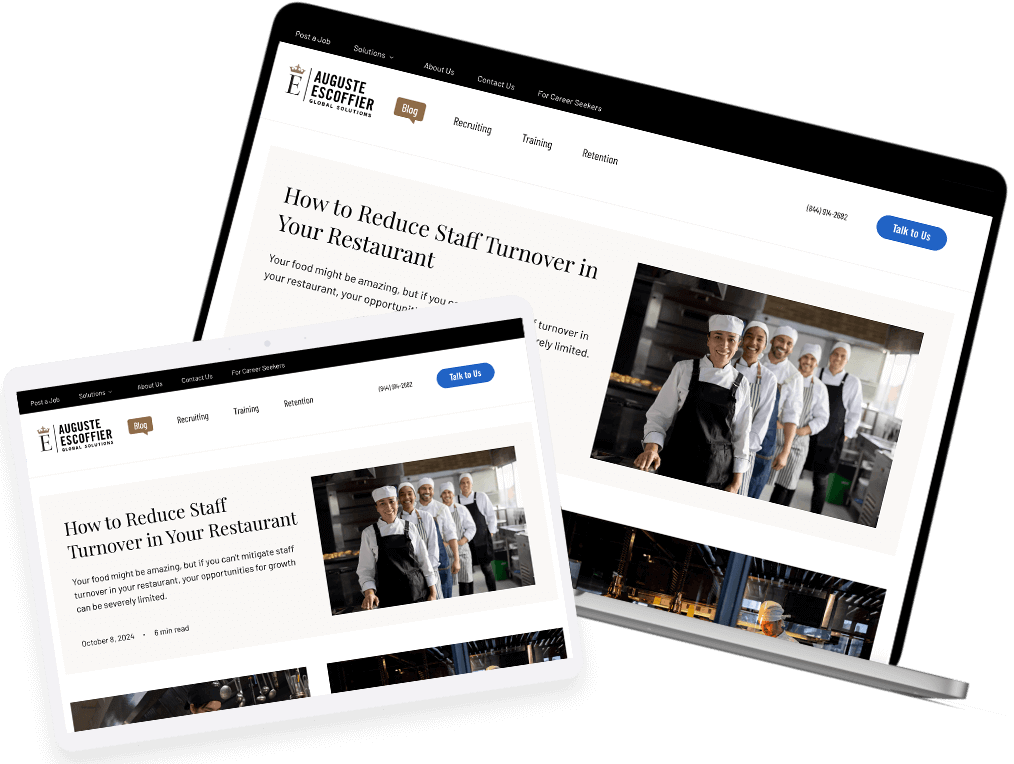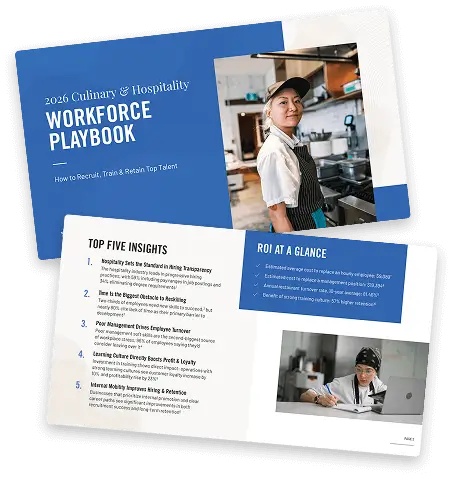
Why Companies are Prioritizing Education Perks for Employees
Discover why employers and employees choose education perks, from reduced staff turnover to better workplace culture.
The U.S. is experiencing a competitive labor market landscape for restaurants, meaning employers must take steps to differentiate themselves.
Despite 200,000 anticipated restaurant job openings in 2025, the National Restaurant Association found that 70% of restaurant owners say job openings are hard to fill. That’s creating a major understaffing headache, with 65% of restaurant owners reporting reduced hours during normal operating hours, and 56% reporting that these shortages significantly impacted their ability to be successful.
Clearly, employers have identified staffing shortages as a chief concern for restaurant success, but many don’t know how to appeal to the right employees–or how to convince them to stick around.
One strategy to consider standing out from the competition is offering education perks such as tuition assistance, self-directed training, and scholarships.
Education perks can be a valuable, mutually-beneficial incentive for companies looking to attract, retain, and upskill talent. And when implemented well, they can offer a range of benefits that help employers achieve a significant return on their investment.
Why Are Education Perks So Desirable?
The cost of higher education is climbing. In 1999, the average cost of a four-year public university education was 19% of median household income. By 2020, it climbed to over 35%. Perhaps that’s why tuition reimbursement and learning perks are some of the most popular company perks offered by successful companies.
Employers are much more open to considering [education] as a strategic benefit rather than just this check-the-box item they had to have because a competitor offered it.
In a survey of 22,000 tuition assistance recipients, 84% of talent said the perk was a significant factor in their decision to take the job.

The Monetary (and Non-Monetary) Return on Investment
Education perks aren’t just beneficial for employees. With well-designed education perks, employers may notice reduced recruitment, on-the-job training, and even product costs. Plus, cultivating a symbiotic environment can boost morale and productivity in the workplace, while reducing absenteeism.
Here are a few of the gains employers may see when they introduce educational perks:
Staff Retention
In the restaurant industry, turnover is especially high, due to factors like the seasonality and transient nature of the industry. This left 88% of restaurant owners surveyed in 2023 saying that recruitment and retention were moderate-to-significant problems for their business.
According to the LinkedIn 2023 Workplace Learning Report, 93% of employers are concerned about turnover. And among employees, three out of the five top factors when considering a new job revolve around skill development and growth.
The LinkedIn survey found learning opportunities were the best-performing strategy to improve retention. As evidence of this, a case study by Accenture found that for every $1 spent on tuition assistance programs, a company saved $1.29 dollars from reduced turnover and recruitment costs.
Hands-Off Learning
Restaurant employers spend significant time and money on paper, shoulder-to-shoulder, and role-specific training. The opportunity cost of dedicating employer time to continued training (a key aspect of job satisfaction), can leech resources that would be better spent elsewhere.
For restaurant owners, who may work longer hours than they care to admit—on everything from inventory, compliance, accounting, marketing, menu development, web design, to management—continued staff training often falls through the cracks. Offering educational perks can remove some of the continued education pressures from higher ups, while still providing employees opportunities to advance.
Programs like Auguste Escoffier Global Solutions’s Work & Learn and ESource put education and career advancement in the hands of employees themselves, and they can bring what they’re learning straight into the kitchen.

The Go-Giver Effect
Bestseller The Go-Giver, written by Bob Burg and John David Mann, focuses on the powerful positive impact of giving unconditionally and providing value. By reorienting to the value companies can provide beyond a salary, Burg and Mann posit that employers can build healthier, more supportive work environments.
In alignment with this theory, Deloitte leaders, Ashley Rechheld and Amelia Dunlop, identified that when employees believe the company has their best interest at heart, they may be 260% more motivated to work, resulting in 41% less absenteeism.
The demand for talent is rising rapidly across the nation. [These strategies] clearly help their own employees, many of whom attended college but have nothing to show for it because they dropped out or stopped out. They help themselves as a business by educating some portion of their own future leadership ranks. And they help the communities where they operate.
[Source]
Better for Customers, Cheaper for You
It’s true, culinarians can learn much of the fundamentals on the job. But, gaps and oversights often remain. Perfecting the brunoise or chiffonade can lead to higher-quality, more consistent dishes that can be prepared more efficiently (key for boosting tight restaurant profit margins).
Plus, upskilling staff can bring in more technical skills that significantly bring down food costs and reduce waste. For example, skilled culinarians trained in butchery can break down whole carcasses, using bones to enhance stock and less common cuts for unique menu offerings. Compared with finished cuts of beef, the savings per pound can add up.

Recruit The Right Candidates
Culinarian education perks are more likely to attract talented job candidates who envision a career, not just a job. Culinary-specific education perks can speak to candidates who are enthusiastic enough to commit their time and resources to developing their industry skills.
Internal Hiring
Education perks can help employees continue their education while working, meaning they’ll develop new skills that can help them advance within the company.
Studies suggest that internal hiring improves retention rates, job performance, and dedication to the company. External hires, on the other hand, demand higher salaries, benefits, and training costs, despite being outperformed on the job by internal hires.
Tax Benefits
Employers offering educational assistance for their staff may qualify for tax benefits under section 127 of the federal tax code. The Internal Revenue Service provides a sample educational assistance program plan that helps employers qualify for these tax benefits.*
*This is for informational purposes only. Consult a tax professional to discuss your specific situation.
Culinary & Hospitality Development Solutions
Job seekers are valuing education perks highly in their decision to take a job, and current employees are factoring these perks into their decision to stay (or leave) their workplace. Employers who listen to the demands of the workforce are realizing that the benefits of education perks can improve their bottom line, too.
Escoffier Global partners with visionary organizations committed to transcending traditional boundaries in hiring, developing, and retaining top talent. Employers can access a suite of culinary and hospitality development solutions, including but not limited to:
Work & Learn: A program designed so employees can earn a living while earning a degree online or on campus at Escoffier’s Boulder, CO or Austin, TX campus. Employees are eligible for a $1,000 scholarship upon sign up, with potential employer-matching tuition assistance up to $5,250 per year.
ESource: A learning platform through Escoffier Global where employees can access both quick, on-the-spot video training, and deeper, assessed learning. Employees can brush up on the specific skills needed at the workplace, or dive into deeper, self-directed micro-courses and more comprehensive courses.
If employers offer education perks and no one knows about them, do the perks really count?
According to some surveys, up to 80% of employees say they’re interested in going to school while they’re working, but only 40% of them knew that their employer offered education perks. In total, the survey found that only 2% of employees took advantage of the offerings and enrolled.
Communicating education perks clearly is critical. Focus on strategies like:
- Using clear, straightforward language
- Communicating information through multiple channels, such as email, in-person meetings, and print-outs
- Highlighting education perks in job postings, interviews, and on-boarding materials
A Leg Up For Employees and Employers Alike
Employees are keen to work with employers who offer educational perks that help them learn new skills and advance their careers. And employers who offer these perks are realizing the benefits of their investment, such as improved retention rates, increased productivity, higher morale, and better menu items.
Through Escoffier Global, employers can access a suite of culinary and hospitality development solutions. With tools that can help make hiring and training easier and more effective, Escoffier Global aims to link great employers with hard-working employees to support the overall health of the hospitality industry. Get in touch with our team for more information on partnering with Escoffier and reaching talented culinary professionals.
Want to see more of what Escoffier Global has to offer? Check out these articles next:



